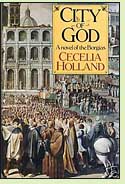City of God
by Cecelia Holland
Reviewed by David Maclaine

There's no way to signify irony by font, so the title City of God might easily mislead a casual book-lover. This gripping novel is set in Rome with more than a few scenes at the Vatican including the pope and occasional cardinals, but there are precious few utterances by any characters showing anything resembling religious feeling. This is, as the subtitle tells us, "A Novel of the Borgias," set during the last few years that Pope Alexander VI - the former Rodrigo Borgia - sat on the throne of St. Peter; that is, when he wasn't at the card table, on the laps of his assorted mistresses, or tending to the interests of his children. These include the celebrated Lucrezia and the brilliant, unscrupulous warlord Cesare, whose plots surround and threaten to destroy the novel's narrator and protagonist, Nicholas Dawson, secretary to the Florentine ambassador to the papal court. Nicholas' counterpart back in Florence - the man who sends him letters and reads the ones he writes - is an off-stage presence whose spirit permeates this work of intrigue and betrayal: Niccolo Machiavelli.
Author Cecelia Holland's characters must navigate the dangerous streets of Rome at the dawn of the sixteenth century, when the crumbling relics of the city's imperial past loom over patches of wasteland and shadowed back streets where thieves and assassins lurk. Nicholas is a suitably detached observer, a man without a country whose flexible moral code allows him to stroll through some of the most infamous scenes of Vatican debauchery without raising an eyebrow. He is at the heart of several vital schemes, with rivals bidding for his loyalty, but his complex sexual entanglement with a young man named Stefano leads him toward life-or-death decisions involving more than pure expediency. City of God is a novel of slowly mounting tension leading to an intense pay-off. It is a brilliant introduction to the people and events that gave us the word "Machiavellian." (1979, 273 pages)
More about City of God at Amazon.comOther novels about the Borgias:
Blood and Beauty by Sarah Dunant (2013), about Rodrigo, Cesare and Lucrezia Borgia. More info
Mirror, Mirror by Gregory Maguire (2009), a retelling of the Snow White story, about a young woman in 1502 Tuscany who grows up under the influence of Lucrezia Borgia. More info
Poison by Sara Poole (2010), a thriller about a woman poisoner who works for Cardinal Rodrigo Borgia during his quest to become pope; #1 in the Poisoner series. See review or more info at Powell's Books
Nonfiction about the Borgias:
The Borgias: The Hidden History by G. J. Meyer (2013), a history of the Borgia family that argues they were not as murderous or debauched as they were reputed to be. More info
The Borgias and Their Enemies by Christopher Hibbert (2008). More info
The Cardinal's Hat: Money, Ambition, and Everyday Life in the Court of a Borgia Prince by Mary Hollingsworth (2004). More info
At the Movies:
The Borgias
Online:
A Brief History of the Borgias at the BBC's History Extra website
Back to Novels of the Renaissance
Back to Directory of Book Reviews